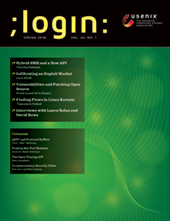
/dev/random: Web of Darkness
;login: Enters a New Phase of Its Evolution
For over 20 years, ;login: has been a print magazine with a digital version; in the two decades previous, it was USENIX’s newsletter, UNIX News. Since its inception 45 years ago, it has served as a medium through which the USENIX community learns about useful tools, research, and events from one another. Beginning in 2021, ;login: will no longer be the formally published print magazine as we’ve known it most recently, but rather reimagined as a digital publication with increased opportunities for interactivity among authors and readers.
Since USENIX became an open access publisher of papers in 2008, ;login: has remained our only content behind a membership paywall. In keeping with our commitment to open access, all ;login: content will be open to everyone when we make this change. However, only USENIX members at the sustainer level or higher, as well as student members, will have exclusive access to the interactivity options. Rik Farrow, the current editor of the magazine, will continue to provide leadership for the overall content offered in ;login:, which will be released via our website on a regular basis throughout the year.
As we plan to launch this new format, we are forming an editorial committee of volunteers from throughout the USENIX community to curate content, meaning that this will be a formally peer-reviewed publication. This new model will increase opportunities for the community to contribute to ;login: and engage with its content. In addition to written articles, we are open to other ideas of what you might want to experience.

Behavior outside the acceptable social norm is part and parcel of human nature. We live, work, play, and interact on a bell curve. We also compute there, as has become increasingly evident in recent years.
I won’t claim to have been present at the birth of the Internet—I was only 12 years old in 1969 when the ball really got rolling—but I spent a fair amount of time in the early to mid-1980s playing with the first incarnations of TCP/IP and hanging around on USENET. As with most of my colleagues at the time, I could see the potential for NSFNET to connect, eventually, all the world’s academic institutions and libraries and thus be a really useful thing to have around. I don’t remember predicting the monster it would actually become, but I did once tell a skeptical boss in the early ’90s that having a web presence and email would be essential to doing business within a few years.
